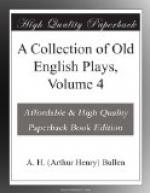Truth. The more the pitty; would the hart
of man
Were not so open wide to entertaine
The harmfull baites of selfe-devouring sinne!
But from the first unto the latter times,
It hath and will be so eternally.——
Now it remaines to have your good advice
Unto a motion of some consequence.
There is a Barke thats newly rigd for sea,
Unmand, unfurnishd with munition:
She must incounter with a greater foe
Then great Alcydes slue in Lerna Lake
Would you be pleasd to man this willing barke
With good conceits of her intencion;
To store her with the thundring furniture
Of smoothest smiles, and pleasing plaudiats;
She shall be able to endure the shock
Of snarling Zoylus, and his cursed crue,
That seekes to sincke her in reproches waves;
And may perchance obteine a victorie
Gainst curious carpes, and fawning parasites:
But if you suffer her, for want of ayde,
To be orewhelmed by her insulting foes,
Oh then she sinckes, that meant to passe the flood
With stronger force to do her countrie good.
It resteth thus; whether she live or dye,
She is your Beades-man everlastinglie.
Finis—Rob. Yarington.
Laus Deo
INTRODUCTION TO THE CAPTIVES; OR, THE LOST RECOVERED.
In Sir Henry Herbert’s MS. Office-Book, under date Sept. 3rd, 1624, is the entry:—“for the Cock-pit Company[44] a new play called the Captive [sic] or the Lost Recovered, written by Hayward,” i.e., Heywood. The lost recovered! Lost for two centuries and a half was this comedy of dear Tom Heywood, until I recovered it from Egerton MS. 1994. I am proud to have rendered this service to a gentle poet who has given me many hours of delight.
The play is without title or author’s name in the MS. After reading the first page I judged that the author was Heywood, and this impression was soon confirmed beyond all doubt. In the MS. the present play is immediately followed by a piece called Calisto, which consists of scenes from Heywood’s Golden Age and Silver Age. I have elsewhere mentioned (Vol. ii. p. 419) that Calisto and The Captives are written in the same desperately difficult handwriting,—peculiar to these two plays, and not found in any other part of the volume. There can be no doubt that whoever transcribed Calisto transcribed also The Captives. But from internal evidence alone—putting aside the testimony afforded by the handwriting, and ignoring the entry in Sir Henry Herbert’s Office-Book—any competent reader could plainly perceive that the play is Heywood’s. In the very first scene—in the conversation between Treadway and Raphael—we feel at once the charm of that hearty “Christianism” which is never absent from Heywood’s work. There is no affectation in Heywood; he is always natural and simple, though occasionally the writing sprawls.




